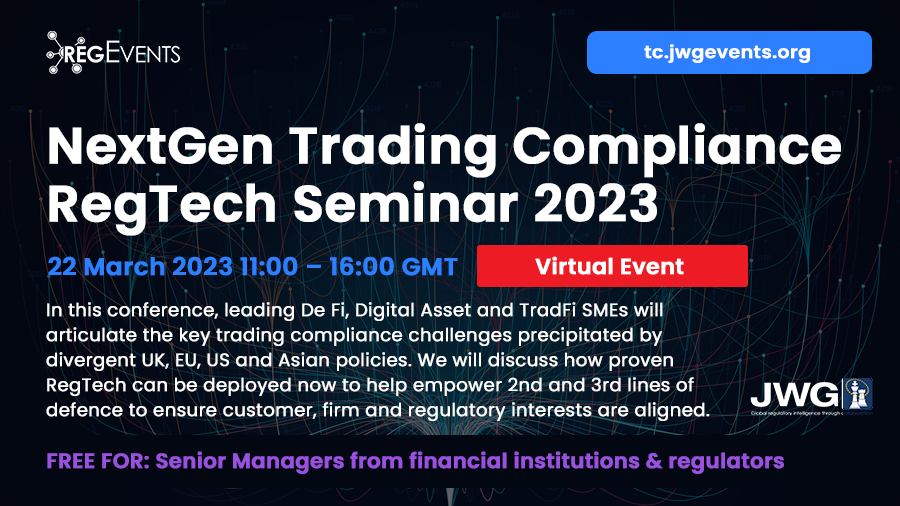The UK’s second discussion paper of 2023 on the benefit of modern technology presents a great chance for the industry to engage on the future of TradFI and DeFi RegTech standards.
Successful reference models can help shape the path for asset management. However, this is an enormous cultural and technical shift which will require broad RegTech coalitions and real leadership.
Join us on 22 March in our global, virtual, Trading compliance seminar to express your views and learn more!
The Financial Conduct Authority (FCA) has published Discussion Paper DP23/2, on the potential benefits of modern technology for the UK’s 2,600 asset management firms.
The paper is the latest and most hard hitting in a series of interventions which has examined the structure of the £11 trillion asset management sector with a view to establishing a better Future Regulatory Framework.
It explores the challenges of creating a common, technology-enabled approach to a regulatory regime cobbled together over decades.
We were pleased to see two entire chapters dedicated to the role of technology in this critical sector which address three key issues:
- How could DeFi help disintermediate current buy-side supply chains?
- What new standards and protocols are required to better share product data?
- How do we revitalize reporting?
All three of these questions involve an alignment between public and private sectors on standards, infrastructure and RegTech approaches. The great news is that we now have successful RegTech examples to help guide the forward path.
Disintermediation and Fund tokenization
Chapter 5 asks whether the FCA should consult on a ‘Direct2Fund’ model which would modernize the way units are bought and sold.
The FCA wants to identify opportunities for technological change in the funds industry and think strategically about longer-term trends, including how unbacked crypto assets could be regulated in the UK.
The paper describes how the FCA is engaging with firms and trade associations, including in relation to proposals for fund tokenization and asks firms to consider how technological changes could drive competition in the interests of consumers while balancing consumer protection and bringing about better outcomes for customers.
It queries the benefits tokenized units in authorized funds would provide for investors and the changes required to enabling this shift.
‘Fund tokenization’ refers to the ability to issue a fund’s rights of participation to investors as digital tokens using a distributed ledger. This would simplify the way units of funds are bought and sold, potentially eliminating some participants and making remaining interactions more efficient.
The paper notes that existing rules governing the creation, transfer, registration, and cancellation of units may not be flexible enough to allow firms to operate a digital register and welcomes input from the industry on the priority and importance of these imperatives.
At first glance, it would appear that a firm understanding of the trade lifecycle and documentation via a standard DLT is required to enable the shifts discussed in this paper.
The Industry has a great opportunity to adopt the newly-standard Common Domain Model (CDM) to fast track this.
Digitizing and central repository for product
The FCA’s new Consumer Duty will require fund managers to give consumers the information they need at the right time and provide a level of support that meets consumers’ needs throughout their relationship with the firm.
The main focus of chapter 6 is on ensuring that prospective investors have the right information about a product or service in the right digital format before they commit money to it through the prospectus.
Prospectuses are generally written in legal, technical language and are often hard to find and not fulfilling its primary function of providing in-depth information to fund investors who want to know more.
Building on DP22/6 on the delivery, presentation and content of disclosure information, the paper notes that the prospectus could be modernized in several ways, including redefining and aligning to international best practice.
In addition to redesigning the forms, the paper suggests that firms tag and label information including ESG.
Going further, they suggest that the prospectus lies in a central repository, such as the FCA’s National Storage Mechanism (NSM) which is used by issuers of listed securities, allowing it to be accessed by a wide range of online users to compare, test legitimacy, and comment about.
Experts will need to be engaged on the role that XBRL will play in the tagging of the information required and how that will be linked back to regulatory requirements.
Revitalizing reporting
Managers’ reports, prescribed long ago as paper documents, are often unengaging documents, given little prominence by fund managers.
As the importance of disclosures increases (e.g., sustainability targets) and the ease of reporting technology improves, investors have a right to expect more timely and well-presented information from firms.
The FCA suggests that a common template to allow machine readability could be developed alongside, or as part of, future revisions of the accounting standards for authorized funds (the Statement of Recommended Practice). They also assert that rules can be enhanced to mandate publication on the fund manager’s website or as part of the NSM.
The industry’s success with Digital Regulatory Reporting which was led by JWG here provides an excellent example for mutualization efforts in this space.
Next steps
A decade ago it would not have been possible to consider a future roadmap that bridges the requirements of TradFi and DeFi. Fortunately, we have come a long way since the bad old days of RegTech being seen as something separate from Banking Tech.
The industry has a great opportunity to build on lessons learnt to catalyze the right coalition for this change, we just need the will to get in the room and work out how.
This consultation closes 22 May 2023 but the dialogue is just getting started. Join us for our next global, virtual, NextGen trading compliance seminar on 22 March to hear from global experts about the regulatory changes ahead and how you can act now to mitigate your risks.


